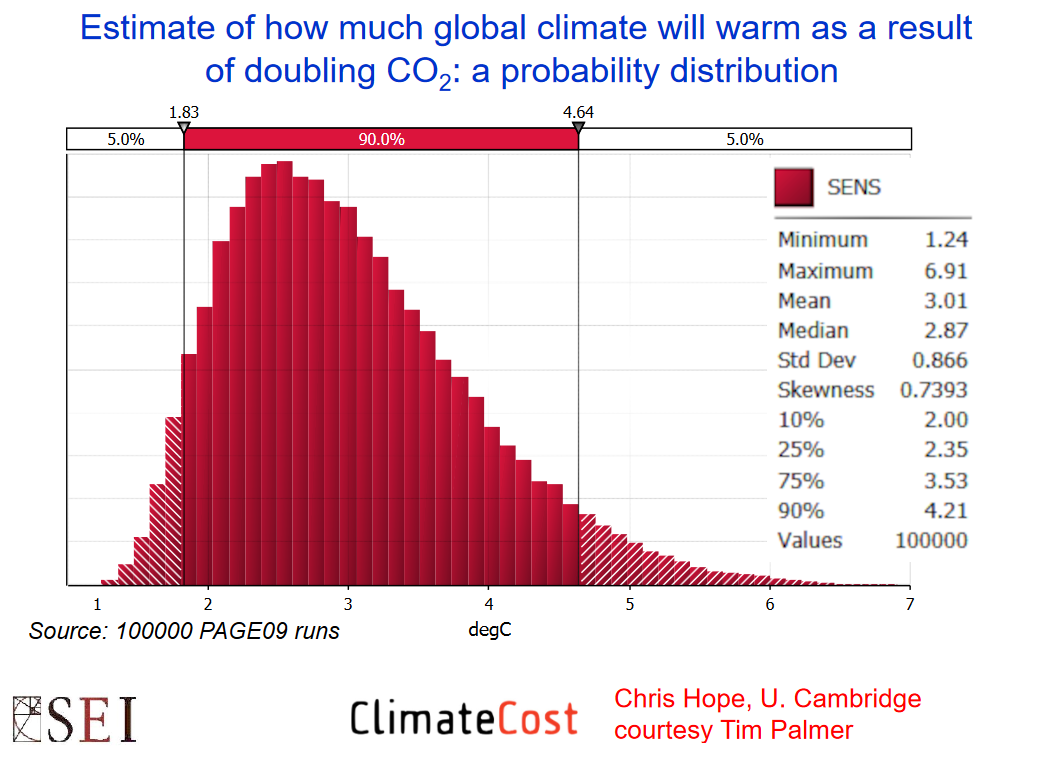|
Cost / Benefit Analysis
of Curbing the Use of Fossil Fuels 
|
|
Key Insight "From a Libertarian
standpoint, if one party is doing
something that harms the property of another party, but the
actor is gaining more than the injured party is losing, should
the government conclude that, on a cost / benefit analysis,
the activity should not be interfered with? That makes no
sense whatsoever from a Libertarian view of private property.
A responsible Libertarian government should intervene in some
way to discourage such activity, or at least make the actor
somehow compensate the injured party." |
|
Non-Climate Harm of Fossil Fuels One thing about energy sources is that, even if you ignore climate change and carbon dioxide, the air pollution created by burning fossil fuels or biomass just kills a lot of people, a lot more than if you obtain the same amount of energy from nuclear, wind, solar, or hydro. And that's only the people who die, as opposed to the many more who just suffer poor health as a consequence. And that cost to society is not reflected in the price of fossil fuels. So we should at least address that, whether global warming is a problem or not. |
|
Probability Distribution of Warming by a Doubling of CO2 Levels 
Courtesy: MIT climate scientist Kerry Emanuel Climate scientists are not certain about how much warming will occur due to a doubling of CO2 levels. CO2 levels in the atmosphere are already nearly 50% higher than they were 150 years ago, and we could easily reach or exceed a doubling by 2100 unless we act. The median is at about 2.9 degrees C (5.2 degrees F), and the mean is about 3 degrees C (5.4 degrees F), but there is a very fat tail at the high end, with 10% probability of 4.2 degrees C (7.5 degrees F) and 5% probability of 4.6 degrees C (8.3 degrees F). Bear in mind that this is global temperature rise, and the temperature is rising much faster at the poles than at more moderate latitudes. Global wind patterns are largely driven by the temperature gradient as you change latitudes, so we are looking at drastic changes to wind and weather patterns, including precipitation patterns, which can wreak havoc with crop yields and water sources. As is discuss in the evidence page of this website, insurance companies have already observed an increase in the rates of storms and flooding. The frequency of hurricanes have increased by only a barely detectable amount, but with several degrees of warming, we would be seeing a much more significant increase in such events. |
|
Niskanen Article on Cost / Benefit Analysis In 2018, an IPCC report came out predicting that the harm to global GDP in 2100 from climate change if we do nothing at all to curb CO2 emissions was 4%. That doesn't sound like much, especially given that we expect the human race to be a lot more prosperous by then. But it's not that simple:
Here is an analysis from the Libertarian Niskanen Center think tank. This article contains a lot of very good material that I am not repeating on this page. You're missing a lot if you don't read it. |
|
Jerry Taylor, Libertarian Climate Activist |
|
Here's a very short
3 minute, 15 second podcast of Jerry
talking abou his evolution from a nationally famous
climate
skeptic at CATO to a staunch advocate of climate
action, and the state of the
climate debate, in 2020.
Click picture for one-hour video of Jerry describing, in 2016, the same thing, in much more detail, and explaining to liberals the point of motivations behind conservative reluctance to cooperate with climate action. |
|
Background on Jerry Taylor: Jerry Taylor spent about two decades as one of the leading climate skeptics in the country. He was one of the leading climate skeptics at the Libertarian CATO institute. Sometime around 2014 / 2015, he changed his mind on the topic, and in the above, he explains why. Major Ideas Discussed: He mentions that pretty much all the famous scientists who are climate skeptics, including Patrick Michaels, Richard Lindtzen, John Cristy, Judith Curry, and Willie Soon, accept that:
Jerry Taylor is a staunch Libertarian, and he believes that the legitimate function of government is to protect the life, liberty and property of individuals, who are to choose to live their lives as they individually see fit. To begin with, the likely harm from climate change is a spectrum of possibilities, ranging from a major nuisance to pretty catastrophic. When one is investing money, one doesn't think of the most likely outcome in isolation and bet everything on that, ignoring all other potential outcomes. For example, most years, stocks outperform bonds. But few saavy investors will put 100% of their portfolio into stocks, because some years the whole stock market crashes. Investors try to hedge their bets to play out well in a variety of scenarios. Doing nothing about climate change fails to hedge our bets across the full spectrum of possible future outcomes posed by global warming. Taylor goes on at length to describe the political landscape of the climate debate, mentioning that many environmentalists such as Al Gore or Naomi Klein say things that are downright horrifying to the average Libertarian. The Green New Deal didn't exist in early 2016 when he made this speech, but it would clearly fit into that category, here is what Jerry Taylor had to say to Green New Deal proponents 3 years after this speech. After leaving CATO, Taylor formed the Niskanen Center, a Libertarian think tank in Washington DC that supports climate action, and many Libertarian positions. In a one-hour keynote speech to Citizens' Climate Lobby (CCL) on June 12th, 2021, Taylor mentioned that part of his evolution from climate skeptic to climate activist was when he was unable to find a single economist who was regularly publishing in peer-reviewed journals who felt that the economic costs of curbing emissions exceeded the costs of failing to do so. There were some "economists" saying it, nobodies teaching at lousy, obscure schools, but not anybody who was regularly publishing in peer-reviewed economics journals. |
| The Jordan Peterson - Bjorn Lomborg Interview |
|
|
|
Positions Taken By Both Peterson and Lomborg:
Bjorn Lomborg, of the Copenhagen Consensus Center, an American think tank, has done a lot of research on how $75 billion could best be spent to do the most benefit for the most people. It turns out that a lot of people in the third world are so poor and unable to afford their most basic needs, that spending money on their health and nutrition would be spectacularly beneficial, per dollar spent, compared to money spent any other way.
Curbing carbon emissions, on the other hand, is extremely expensive, and the anticipated harm done by global warming is not great enough to justify such spending in comparison with third world health and nutrition spending. There are a few flaws in this logic:
|
